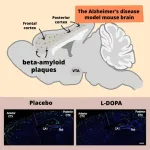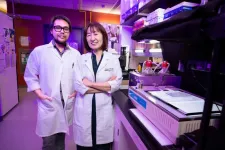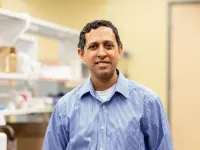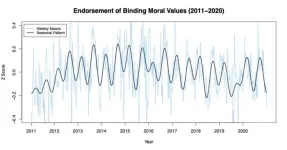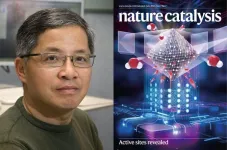(Press-News.org) Damon Runyon Cancer Research Foundation awards $5.2 million to top clinical investigators
The Damon Runyon Cancer Research Foundation has named six new Damon Runyon Clinical Investigators. The recipients of this prestigious award are outstanding, early-career physician-scientists conducting patient-oriented cancer research at major research centers under the mentorship of the nation's leading scientists and clinicians.
The Clinical Investigator Award program was designed to increase the number of physicians capable of translating scientific discoveries into new treatments for cancer patients. Each Awardee will receive $600,000 over three years, as well as assistance with research costs such as the purchase of equipment. Because the need to repay medical school loans is often cited as a deterrent to pursuing research, Damon Runyon will also retire up to $100,000 of medical school debt owed by the awardee.
The Foundation also awarded Continuation Grants to four Damon Runyon Clinical Investigators for an additional two years of funding, totaling $400,000 each. The Continuation Grants are designed to support Clinical Investigators who are approaching the end of their original award and need more time to work on a promising avenue of research or a clinical trial.
Physician-scientists have an important role to play in public health research as well.
“In addition to Damon Runyon’s funding of basic science, funding projects that are more translational or epidemiologic in their focus is really important,” says 2024 Continuation Grantee Kelly L. Bolton, MD, PhD. “Looking at population databases to try to understand cancer risk and prevention, for example—it's really helpful when physicians are involved.”
This program is possible through the support of the William K. Bowes, Jr. Foundation. Through partnerships with generous donors, industry sponsors, and its Accelerating Cancer Cures initiative, the Damon Runyon Cancer Research Foundation has committed millions to support the careers of physician-scientists across the United States since 2000.
2024 Clinical Investigators
Steven M. Corsello, MD [Leslie Cohen Seidman Clinical Investigator], with mentors Nathanael S. Gray, PhD, and Ronald Levy, MD, at Stanford University School of Medicine, Stanford
Pancreatic cancer is a devastating disease with limited treatment options. New strategies are urgently needed, but few actionable therapeutic targets are known. By systematically testing diverse molecules against pancreatic cancer cells combined with gene knockout studies, Dr. Corsello has identified a starting point to simultaneously activate inflammatory signaling and cell death pathways. He will determine the efficacy and underlying molecular mechanism of this approach, and potential immunotherapy combinations, using patient-derived tumor models. His goal is to accelerate the development of more effective and less toxic therapies for pancreatic cancer.
Megan L. Insco, MD, PhD, with mentor F. Stephen Hodi, MD, at Dana-Farber Cancer Institute, Boston
Gene expression is a complex process, and sometimes mistakes are made, resulting in the generation of aberrant or “junk” RNAs. Dr. Insco previously discovered that cellular failure to “clean up” this junk RNA can contribute to the development and progression of melanoma. Her work is now focused on targeting aberrant RNA to treat cancer. First, she will identify compounds that specifically target melanomas that are unable to clean up their junk RNAs. Second, she will investigate how immune cells can be activated to attack melanoma cells that have high levels of aberrant RNAs. Many advances in our understanding of RNA biology over the last four decades have resulted in new therapies for patients. As this area of RNA biology is almost completely unexplored, Dr. Insco anticipates that studying mechanisms of aberrant RNA oncogenesis will reveal new therapeutic strategies for patients.
Mary M. Mullen, MD, with mentors Dineo Khabele, MD, and Nima Mosammaparast, MD, PhD, at Washington University, St. Louis
Only up to 20% of patients with advanced ovarian cancer will survive five years after diagnosis. This is largely due to the cancer’s resistance to traditional chemotherapy and the current lack of targeted therapies that work with chemotherapy to improve response. Dr. Mullen’s lab has identified a new target, COP9 Signalosome Subunit 5 (COPS5), to treat ovarian cancer. Her team has found that inhibiting COPS5 with a drug called CSN5i-3 drastically improves ovarian cancer response to chemotherapy. She now aims to test the effectiveness of CSN5i-3 and chemotherapy against patient-derived, therapy-resistant ovarian cancer tumors. She will also investigate the mechanism of COPS5, believed to be involved in the repair of DNA damage caused by chemotherapy. Dr. Mullen hopes this innovative target will transform the care of patients with ovarian cancer.
Erin M. Parry, MD, PhD, with mentor Margaret A. Shipp, MD, at Dana-Farber Cancer Institute, Boston
Histologic transformation, when a cancer’s features shift dramatically and it presents as a new cancer type, can occur at any point in the course of disease or arise due to the selective pressure of cancer therapies. One of the most well-recognized examples of histologic transformation is the transformation of follicular lymphoma, a slow-growing cancer of the lymphocytes, to an aggressive lymphoma, typically a large B-cell lymphoma. Despite this being well-recognized in the clinic, understanding of the molecular changes that trigger this transformation remains limited. Dr. Parry seeks to comprehensively study the genetics underlying follicular lymphoma transformation with a goal of improving future recognition and diagnosis of transformation. She also aims to identify unique potential therapeutic targets associated with follicular lymphoma transformation.
John R. Prensner, MD, PhD [Ben and Catherine Ivy Foundation Clinical Investigator], with mentors Sriram Venneti, MD, PhD, and Carl J. Koschmann, MD, at University of Michigan, Ann Arbor
New therapeutic approaches are urgently needed for children suffering from high-risk medulloblastoma, a form of pediatric brain cancer, where half of children will experience disease relapse leading to death. Dr. Prensner’s work is focused on understanding the biological underpinnings of high-risk medulloblastoma and developing new treatment options. His team recently found that high-risk medulloblastoma may exploit an imbalance in the production of proteins from the tumor cell genetic material (RNA, DNA). Dr. Prensner aims to define the cancer biology that causes an imbalance in the protein-RNA ratio in medulloblastoma, and investigate specific therapeutic options that may target this biology. His hope is that this work leads to new options for clinical trials for children with high-risk medulloblastoma.
Lachelle D. Weeks, MD, PhD [Damon Runyon-Timmerman Traverse Clinical Investigator], with mentor Benjamin L. Ebert, MD, PhD, at Dana-Farber Cancer Institute, Boston
Dr. Weeks plans to develop computerized models that can review images of blood cells and predict a patient’s risk of developing acute myeloid leukemia. Because computers can capture small changes in imagesbetter than humans looking at cells under a microscope, such a model could connect data about the shapes and appearance of blood cells to the presence of pre-leukemia genetic changes known as clonal hematopoiesis. This work will inform the extent to which blood cell appearance is associated with the underlying biology of leukemia and Pre-leukemia. Ultimately, Dr. Weeks aims to refine existing models of leukemia risk prediction and pave the way for screening programs that can identify individuals with clonal hematopoiesis who are at the highest risk for progressing to cancer.
2024 Continuation Grantees
Kelly L. Bolton, MD, PhD, with mentors Matthew J. Walter, MD, and Eytan M. Stein, MD, at Washington University School of Medicine, St. Louis
Myeloid neoplasms (MN), including acute myeloid leukemia and myelodysplastic syndrome, are lethal blood cancers. The genetic mutations in the blood that lead to MN can occur years before diagnosis and maintain almost normal function before transformation. Certain mutations, including those in the gene IDH2, have been identified as high-risk for developing MN. Individuals with a reduction in the number of mature blood cells (cytopenias) who harbor acquired mutations in their blood, yet do not meet criteria for a cancer diagnosis, have a condition called cytopenias of undetermined significance (CCUS). These individuals almost invariably develop MN. Dr. Bolton will conduct a clinical trial to evaluate whether the IDH2 inhibitor enasidenib can be used as a therapy for CCUS. She will assess mechanisms of resistance and determine whether enasidenib can prevent the development of MN. This represents the first use of genetically targeted therapy for cancer prevention.
Alexander C. Huang, MD, with mentors Gerald P. Linette, MD, PhD, and E. John Wherry, PhD, at University of Pennsylvania, Philadelphia
Immune checkpoint inhibitors (ICI), like anti-PD-1 therapy (αPD-1), have transformed clinical oncology by inducing long-term remissions, even in metastatic disease. However, fewer than 40% of cancer patients achieve such long-term remission with αPD-1, and immune-related toxicity limits more aggressive combined approaches, such as anti-PD1 and anti-CTLA-4 therapy. The question remains why a large portion of the immune response generated by combination immunotherapy is directed towards toxicity rather than anti-tumor immunity. A better understanding of the T-cell response to ICI is needed to develop safer and more effective treatment strategies. In humans, CD8+ T-cells are responsible for anti-tumor immunity. Dr. Huang is investigating the immune responses of different types of CD8+ T-cells to αPD-1 and whether they play a role in determining clinical efficacy and immune toxicity.
David Y. Oh, MD, PhD, with mentor Lawrence Fong, MD, at University of California, San Francisco
While immunotherapies such as anti-PD-1 therapy have provided an important treatment option for bladder cancer, the majority of patients do not respond to these regimens. This may reflect the distinct activation requirements of other immune T cells besides CD8+ T-cells. In recent work, Dr. Oh and colleagues have identified cytotoxic (cancer cell-killing) CD4+ T-cells in human bladder cancer that are associated with immunotherapy responses. However, the regulation of cytotoxic CD4+ T-cells and how these mechanisms compare with CD8+ T-cells is not understood. Dr. Oh proposes to identify and validate surface receptors that enhance or inhibit the activity of cytotoxic CD4+ T cells in human bladder cancer, and the tumor antigens that are recognized specifically by these cells. He will also compare which of these regulatory mechanisms are unique to cytotoxic CD4+ T-cells relative to their CD8+ T-cell counterparts from the same patients. This work has the potential to increase both the proportion of bladder cancer patients who respond to immunotherapy as well as the quality of their response.
Phillip L. Palmbos, MD, PhD, with mentor Joshi J. Alumkal, MD, at University of Michigan, Ann Arbor
Although immunotherapy results in improved survival for some patients with advanced bladder cancer, most tumors do not respond, and the molecular drivers of this resistance to immunotherapy are poorly understood. Dr. Palmbos’ goal is to use advanced bladder cancer models and patient data to identify the molecular drivers of resistance to bladder cancer therapy and to develop therapeutic strategies to reverse therapy resistance. His group has identified a gene, TRIM29, which is expressed in 70% of bladder cancers and is associated with immunotherapy resistance. TRIM29 is a protein that promotes degradation of STING and other innate immune proteins that drive anti-tumor immune response. Dr. Palmbos is currently investigating the regulation of the TRIM29-STING pathway and developing strategies to sensitize bladder and other cancer types to immunotherapy.
***
Damon Runyon Cancer Research Foundation
To accelerate breakthroughs, the Damon Runyon Cancer Research Foundation provides today's best young scientists with funding to pursue innovative research. The Foundation has gained worldwide prominence in cancer research by identifying outstanding researchers and physician-scientists. Thirteen scientists supported by the Foundation have received the Nobel Prize, and others are heads of cancer centers and leaders of renowned research programs. Each of its award programs is extremely competitive, with less than 10% of applications funded. Since our founding in 1946, in partnership with donors across the nation, the Damon Runyon Cancer Research Foundation has invested more than $450 million and funded nearly 4,000 scientists.
100% of all donations to the Foundation are used to support scientific research. Administrative and fundraising costs are paid with revenue from the Damon Runyon Broadway Tickets Service and our endowment.
For more information visit damonrunyon.org.
END
Damon Runyon Cancer Research Foundation awards $5.2 million to top clinical investigators
2024-08-06
ELSE PRESS RELEASES FROM THIS DATE:
Good outcomes 10 years after surgery for ectopic bone in thoracic spine
2024-08-06
August 6, 2024 — Thoracic ossification of the posterior longitudinal ligament (TOPLL) is a rare condition associated with ectopic bone formation in the thoracic spine. A long-term follow-up study from Japan shows significant and lasting improvement in outcomes with posterior decompression and fixation surgery for patients with T-OPLL, reports The Journal of Bone & Joint Surgery. The journal is published in the Lippincott portfolio by Wolters Kluwer.
"Surgical treatment of T-OPLL is effective in improving neurological function, quality ...
Dopamine treatment alleviates symptoms in Alzheimer’s disease
2024-08-06
A new way to combat Alzheimer’s disease has been discovered by Takaomi Saido and his team at the RIKEN Center for Brain Science (CBS) in Japan. Using mice with the disease, the researchers found that treatment with dopamine could alleviate physical symptoms in the brain as well as improve memory. Published in the scientific journal Science Signaling on August 6, the study examines dopamine’s role in promoting the production of neprilysin, an enzyme that can break down the harmful plaques in the brain that are the ...
Do your supplements contain potentially hepatoxic botanicals?
2024-08-06
Millions of Americans consume supplements that contain potentially hepatoxic botanical ingredients, according to a study from University of Michigan researchers.
Over a 30-day period, 4.7% of the adults surveyed in the National Health and Nutrition Examination Survey conducted from 2017 to 2020 took herbal and dietary supplements containing at least one of the botanicals of interest: turmeric; green tea; ashwagandha; black cohosh; garcinia cambogia; and red yeast rice containing products.
The resulting paper, “Estimated Exposure ...
No room for nuance in polarized political climate: SFU study
2024-08-06
Sometimes you just can’t win, and that goes double for people navigating the increasingly polarized political landscape in the United States.
Having nuanced opinions of politics in the U.S. turns out to be a very lonely, and unpopular, road, according to a recent study from a research team that includes assistant professor Aviva Phillipp-Muller from Simon Fraser University’s Beedie School of Business.
Published in the Journal of Experimental Social Psychology, the study found that people who express ambivalence about political topics – ranging from COVID-19 mask mandates, immigration and the death ...
What happens to your brain when you drink with friends?
2024-08-06
EL PASO, Texas (Aug. 6, 2024) – Grab a drink with friends at happy hour and you’re likely to feel chatty, friendly and upbeat. But grab a drink alone and you may experience feelings of depression. Researchers think they now know why this happens.
“Social settings influence how individuals react to alcohol, yet there is no mechanistic study on how and why this occurs,” said Kyung-An Han, Ph.D., a biologist at The University of Texas at El Paso who uses fruit flies to study alcoholism.
Now, Han and a team of UTEP faculty and students have taken a key step in understanding the neurobiological process behind social drinking and how it boosts ...
University of Houston researchers create new treatment and vaccine for flu and various coronaviruses
2024-08-06
A team of researchers, led by the University of Houston, has discovered two new ways of preventing and treating respiratory viruses. In back-to-back papers in Nature Communications, the team - from the lab of Navin Varadarajan, M.D. Anderson Professor of William A. Brookshire Chemical and Biomolecular Engineering - reports the development and validation of NanoSTING, a nasal spray, as a broad-spectrum immune activator for controlling infection against multiple respiratory viruses; and the development of NanoSTING-SN, a pan-coronavirus nasal vaccine, that can protect against infection and disease by all members of the coronavirus family.
NanoSTING ...
People's moral values change with the seasons
2024-08-06
A new UBC study has revealed regular seasonal shifts in people’s moral values.
The finding has potential implications for politics, law and health—including the timing of elections and court cases, as well as public response to a health crisis.
The research published this week in Proceedings of the National Academy of Sciences (PNAS) analyzed survey responses from more than 230,000 people in the U.S. over 10 years and revealed that people’s embrace of certain moral ...
Researchers reveal atomic-scale details of catalysts’ active sites
2024-08-06
The chemical and energy industries depend upon catalysts to drive the reactions used to create their products. Many important reactions use heterogeneous catalysts — meaning that the catalysts are in a different phase of matter than the substances they are reacting with, such as solid platinum reacting with gases in an automobile’s catalytic converter.
Scientists have investigated the surface of well-defined single crystals, illuminating the mechanisms underlying many chemical reactions. However, there is much more to be learned. For heterogeneous catalysts, their 3D atomic structure, their chemical composition and the nature of ...
The prescription for a healthier democracy
2024-08-06
When we’re sick, the first step on the road to recovery is a visit to the doctor’s office.
It turns out the same may also be true for breathing life into America’s democracy.
A Rutgers University–New Brunswick study published in the journal JAMA Health Forum finds that physicians can play a crucial role in strengthening political inclusion of marginalized groups by aiding patients in voter registration.
“Hospitals aren’t the first place we think of when it comes to voter registration,” said Katherine McCabe, an associate professor of American politics at Rutgers University-New Brunswick and lead ...
New substrate material for flexible electronics could help combat e-waste
2024-08-06
Electronic waste, or e-waste, is a rapidly growing global problem, and it’s expected to worsen with the production of new kinds of flexible electronics for robotics, wearable devices, health monitors, and other new applications, including single-use devices.
A new kind of flexible substrate material developed at MIT, the University of Utah, and Meta has the potential to enable not only the recycling of materials and components at the end of a device’s useful life, but also the scalable manufacture of more ...
